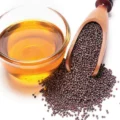Borage oil is a natural oil that is extracted from the seeds of the borage plant, also known as Borago officinalis. It is a rich source of gamma-linolenic acid (GLA), an essential fatty acid that is important for the maintenance of overall health.
Benefits of borage oil:
- Anti-inflammatory: Borage oil has anti-inflammatory properties that may help reduce inflammation in the body, particularly in conditions such as rheumatoid arthritis, eczema, and psoriasis.
- Skin health: Borage oil is often used in skin care products due to its ability to improve skin texture and hydration. It may also help reduce the appearance of fine lines and wrinkles.
- Hormonal balance: GLA, the main component of borage oil, is important for maintaining hormonal balance in the body. It may be particularly helpful for women experiencing premenstrual syndrome (PMS) and menopause-related symptoms.
- Cardiovascular health: Borage oil may help improve cardiovascular health by reducing inflammation, lowering blood pressure, and improving cholesterol levels.
- Immune system support: Borage oil may help support the immune system by improving the production of prostaglandins, which are important for fighting infections and inflammation.
Overall, borage oil is an important natural remedy that can help improve overall health and well-being. However, it is important to note that borage oil may interact with certain medications, so it is best to consult with a healthcare professional before using it for medicinal purposes.
Nutrition facts of borage oil:
Borage oil is a rich source of essential fatty acids, particularly gamma-linolenic acid (GLA). Here are the approximate nutrition facts of borage oil per 100 grams:
- Calories: 884
- Fat: 100 g
- Saturated Fat: 11 g
- Monounsaturated Fat: 20 g
- Polyunsaturated Fat: 69 g
- Omega-6 Fatty Acids: 66 g
- Gamma-Linolenic Acid (GLA): 22 g
Borage oil also contains small amounts of vitamin E, a fat-soluble antioxidant that is important for maintaining healthy skin, eyes, and immune system.
It’s worth noting that borage oil is not typically consumed in large quantities like other dietary oils. Instead, it is commonly used in smaller amounts for its medicinal properties. As with any dietary supplement, it’s important to speak with a healthcare professional before using borage oil for medicinal purposes.
Risks of borage oil:
While borage oil has numerous health benefits, consuming it in excess or for extended periods may lead to adverse effects. Here are some of the risks associated with borage oil:
- Liver damage: Borage oil contains pyrrolizidine alkaloids, which can be toxic to the liver if consumed in high doses or for extended periods.
- Bleeding disorders: Borage oil may increase the risk of bleeding in people with bleeding disorders or those taking blood-thinning medications.
- Pregnancy and breastfeeding: Borage oil should be avoided during pregnancy and breastfeeding due to the risk of birth defects and other complications.
- Allergic reactions: Some people may be allergic to borage oil, which can lead to symptoms such as hives, itching, and difficulty breathing.
- Interactions with medications: Borage oil may interact with certain medications, including blood thinners and anti-inflammatory drugs.
Overall, borage oil is safe to consume in small quantities, but consuming it in excess or for extended periods may lead to adverse effects. If you are considering using borage oil for medicinal purposes or have any concerns about its use, it is best to consult with a healthcare professional first.




